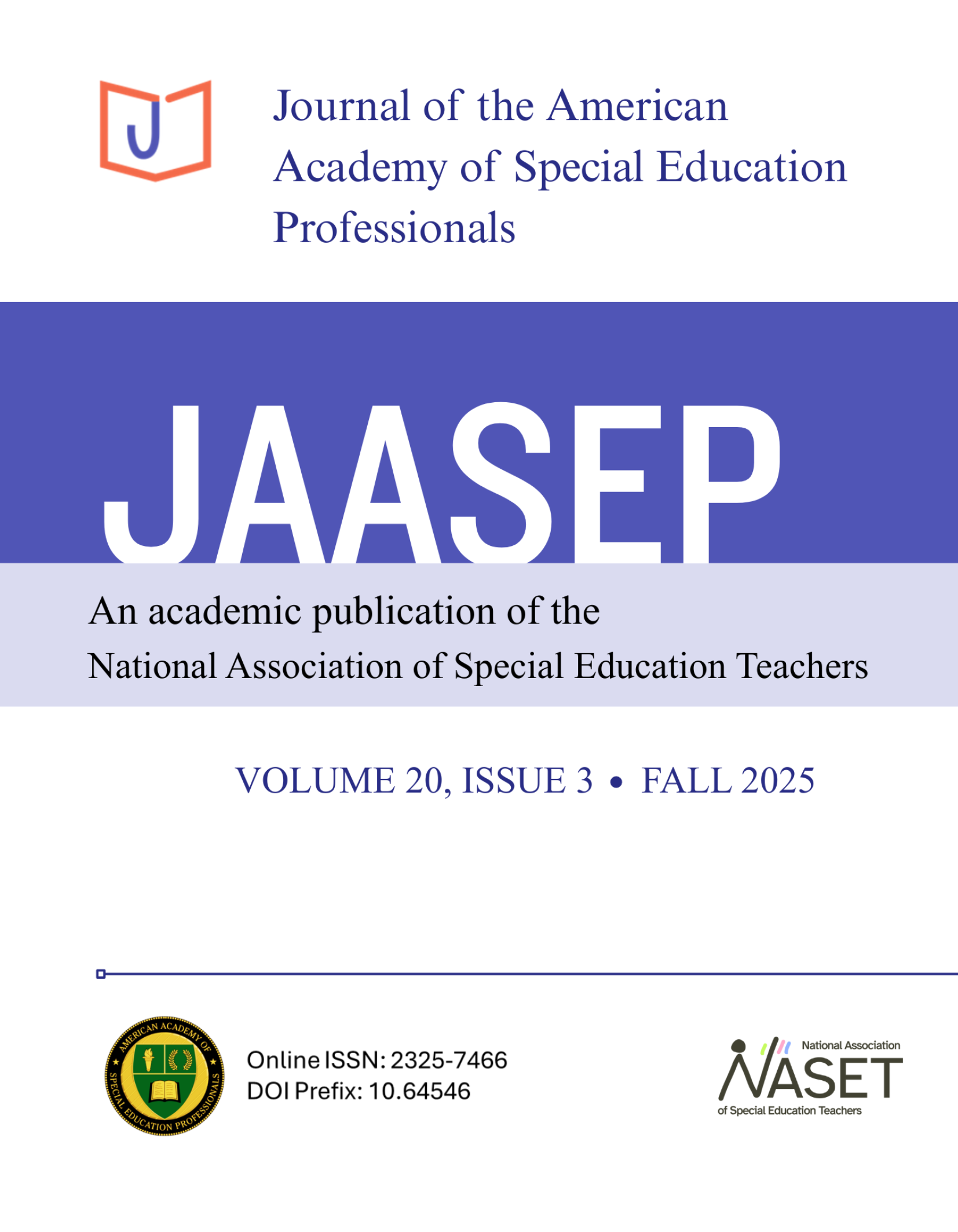Retaining special education teachers in a rural Southern United States school district
Bailey, T., & Zumeta, R. (2015). How states can help rural LEAs meet the needs of special populations. The Sea of the Future, 4, 43–52.
Barton, R. (2012). Recruiting and retaining rural educators: Challenges and strategies.
Principal’s Research Review, 7(6), 1-6.
Berry, A. (2012). The relationship of perceived support to satisfaction and commitment for special education teachers in rural areas. Rural Special Education Quarterly, 31(1), 3-14. DOI: https://doi.org/10.1177/875687051203100102
Billingsley, B., & Bettini, E. (2019). Special education teacher attrition and retention: A review of the literature. Review of Educational Research, 89(5), 697–744. DOI: https://doi.org/10.3102/0034654319862495
Bounds, S., & King, J. (2017). Ebbing the flow. In Global Conference on Education and Research (pp. 70–83). Sarasota, FL: University of South Florida.
Bloomberg, L. D., & Volpe, M. (2016). Completing your qualitative dissertation: A road map from beginning to end. Thousand Oaks, CA: Sage Publications.
Camp, A., Zamarro, G., & McGee, A. J. (2023, March 15). University of Arkansas. Retrieved from https://oep.uark.edu/three-years-later-arkansas-teacher-turnover-during-and-after-covid-19/
Cullen, D. (2019). Factors that influence special education teacher retention: An evaluation of special education retention in Northeastern Pennsylvania (Order No. 13862878). Available from ProQuest Dissertations & Theses Global. (22186140009). Retrieved from http://0-search.proquest.com.library.uark.edu/docview/2218614009?accountid=8361
Harmon, H. (2005). Collaboration: A partnership solution in rural education. The Rural Educator, 38(1), 1-5. DOI: https://doi.org/10.35608/ruraled.v38i1.230
Jones, L., Stall, G., & Yarbrough, D. (2013). The importance of professional learning communities for school improvement. Creative Education, 4(5), 357-361. DOI: https://doi.org/10.4236/ce.2013.45052
Kolb, S. M. (2012). Grounded theory and the constant comparative method: Valid research strategies for educators. The Journal of Special Education, 3(1), 83–86.
Maguire, M., & Delahunt, B. (2017). Doing a thematic analysis: A practical, step-by-step guide for learning and teaching scholars. All Ireland Journal of Teaching and Learning in Higher Education, 8(3), 3351–33514.
Marshall, C. & Rossman, G. B. (2016). Designing Qualitative Research. Thousand Oaks, CA: Sage Publications.
Morrison, C. (2013). Slipping through the cracks: One early career teacher’s experiences of rural teaching and the subsequent impact on her personal and professional identities. Australian Journal of Teacher Education, 38(6), 116–135. DOI: https://doi.org/10.14221/ajte.2013v38n6.10
National Center for Education Statistics. (2023). Children in rural areas and their family characteristics. Retrieved from https://nces.ed.gov/programs/coe/indicator/lfa/family-characteristicsrural#:~:text=Nationally%2C%2014%20percent%20of%20related,cities%20(21%20percent%20each)
Ravitch, S. M., & Carl, N. M. (2016). Qualitative research: Bridging the conceptual, theoretical, and methodological. Thousand Oaks, CA: Sage Publications.
Robinson, O.P., Bridges, S.A., Rollins, L.H., & Schumaker, R.E. (2019). A study of the relation between special education burnout and job satisfaction. Journal of Research in Special Educational Needs. doi: 10.1111/1471-3082.12448 DOI: https://doi.org/10.1111/1471-3802.12448
Rude, H., & Miller, K. (2018). Policy challenges and opportunities for rural special education. Rural Special Education Quarterly, 37(1), 21-29. DOI: https://doi.org/10.1177/8756870517748662
Sindelar, P., Pua, D., Fisher, T., Peyton, D., Brownell, M., & Mason-Williams, L. (2018). The demand for special education teachers in rural schools revisited: An update on progress. Rural Special Education Quarterly, 37(1), 12–20. DOI: https://doi.org/10.1177/8756870517749247
Saldana, J. (2013). The coding manual for qualitative researchers. Thousand Oaks, CA: Sage Publications.
U.S. Department of Education. (2022). The condition of education 2022 (NCES 2022-144). National Center for Education Statistics. Retrieved from https://nces.ed.gov/programs/coe/indicator/tlc
Vittek, J. E. (2015, April–June). Promoting special educator teacher retention: A critical review of the literature. Sage Open, 1, 1–6. DOI: https://doi.org/10.1177/2158244015589994
Wong, A. (2023, January). Amid crippling teacher shortages, some schools are turning to unorthodox solutions. USA TODAY. Retrieved from https://www.usatoday.com/story/news/education/2023/01/22/alternative-programs-may-help-teacher-shortages/11033852002/
Willis, C. B. (2019). Examining the relationship of administrative support on early career special education teachers’ retention decisions. Retrieved from https://scholarscompass.vcu.edu/etd/5751
